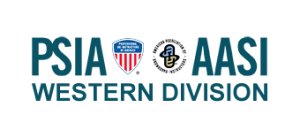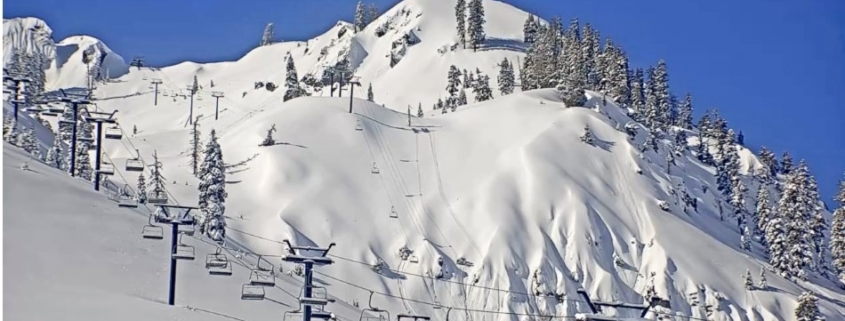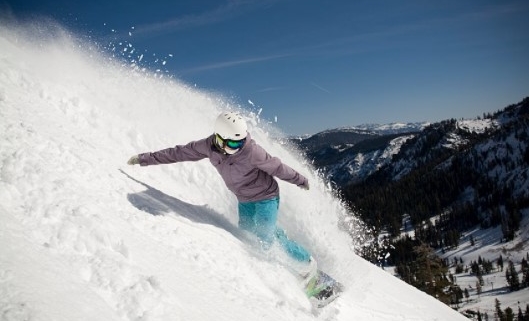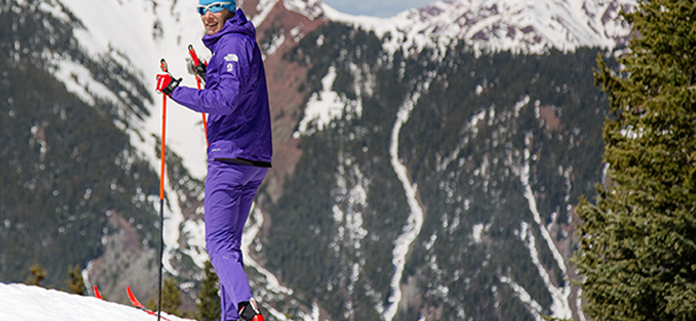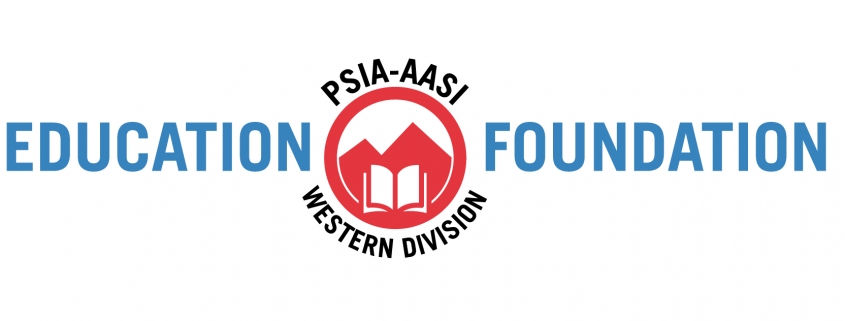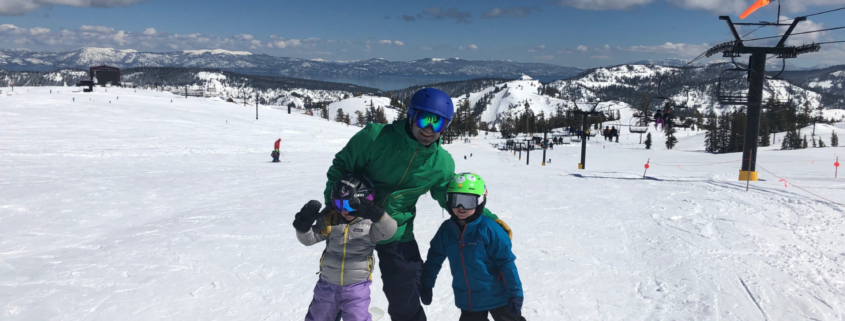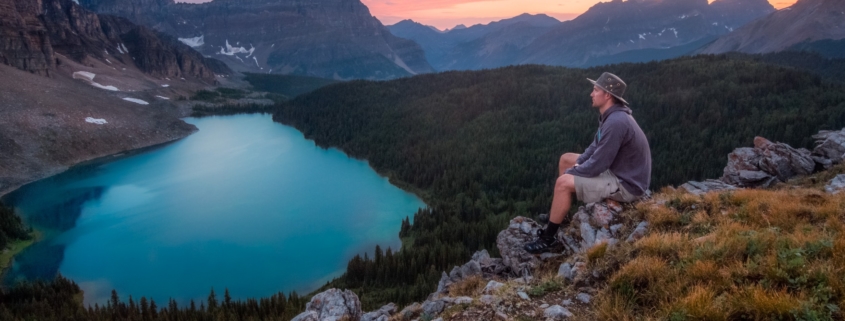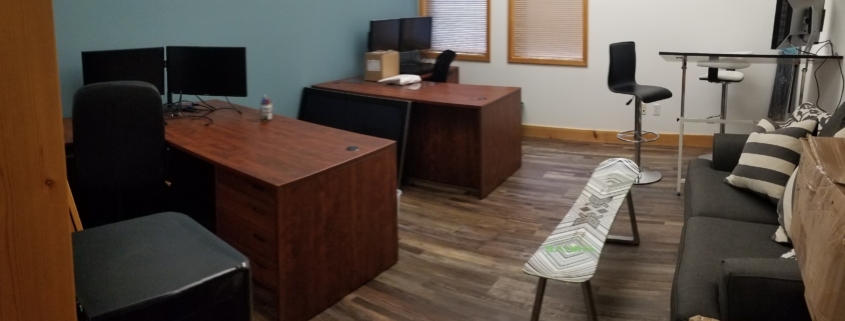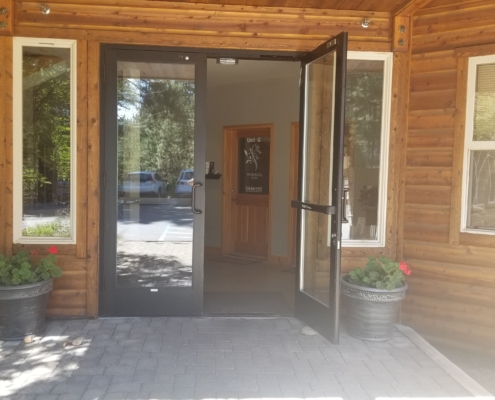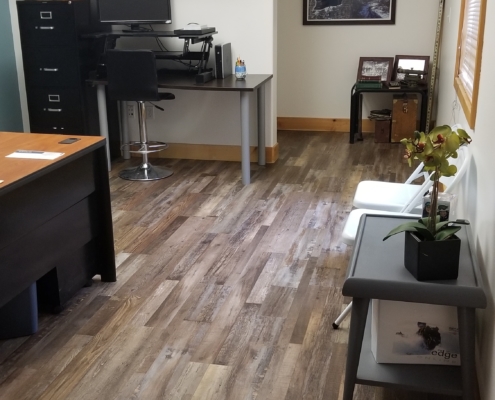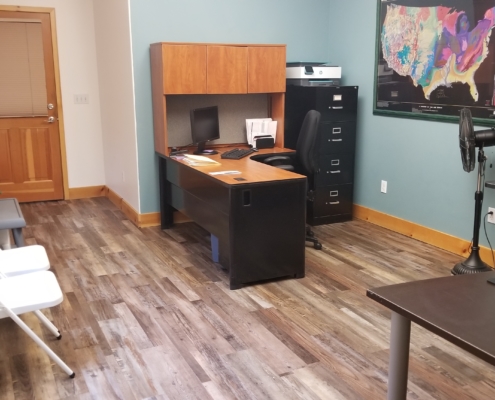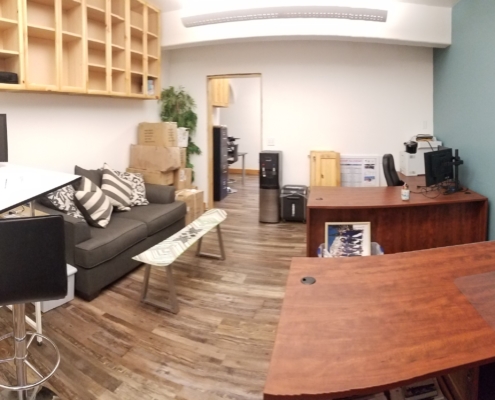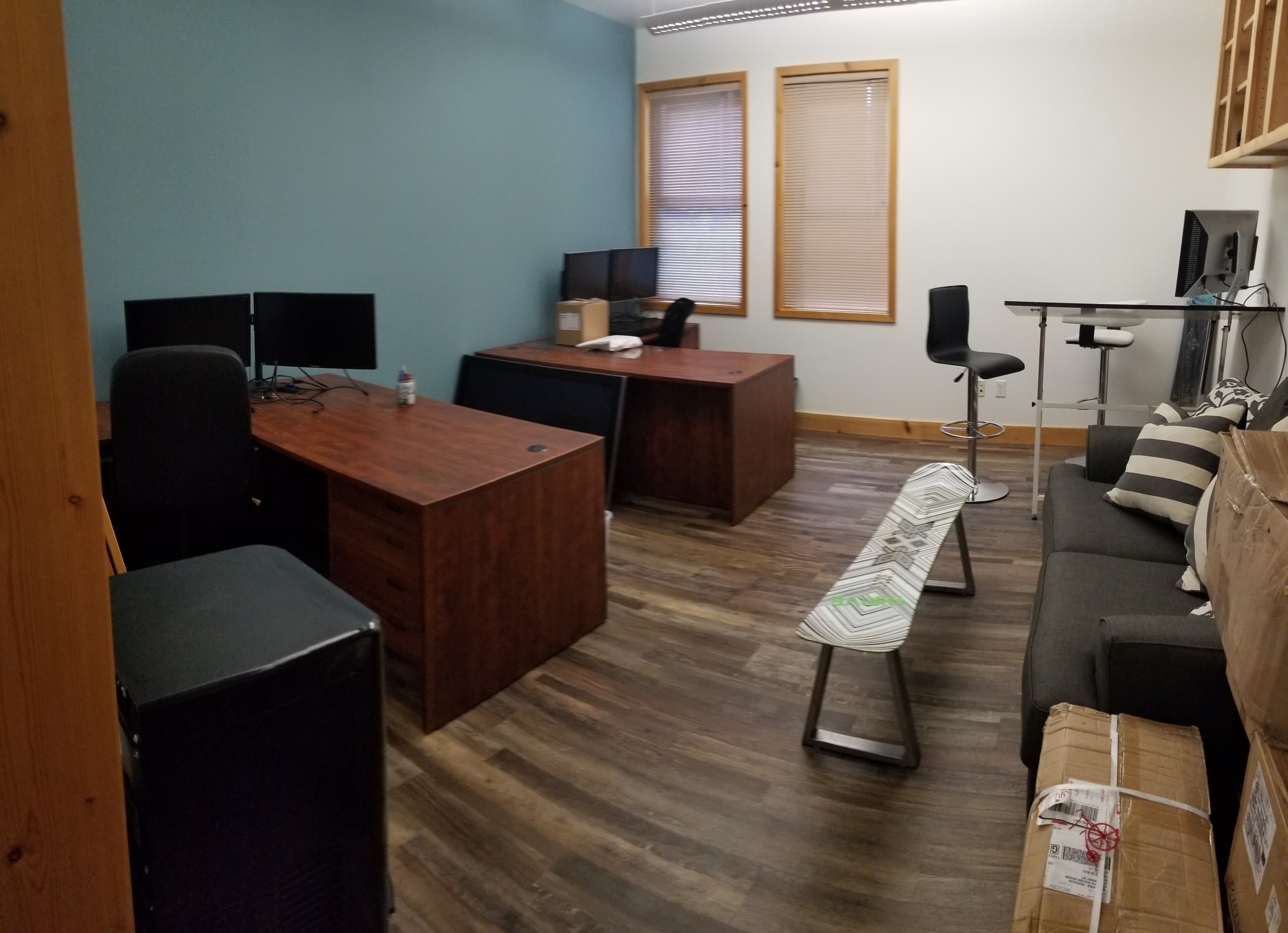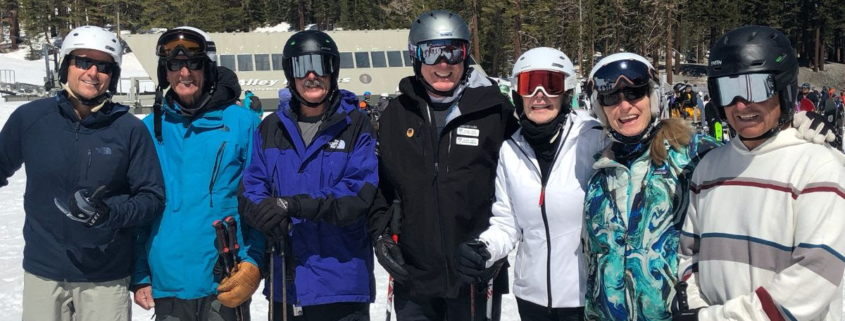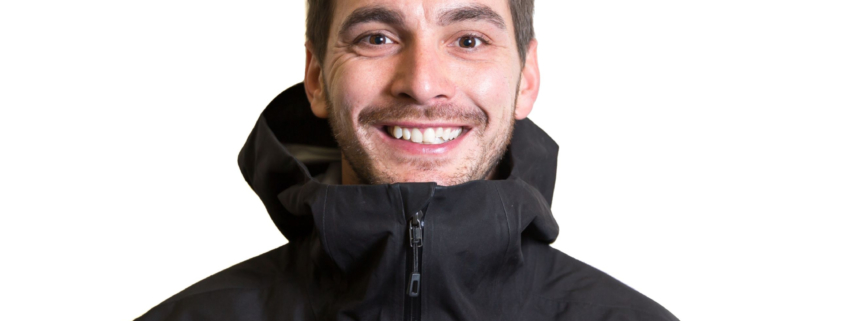Western Board Round Table
Report on Board Round Table with Membership
October 21, 2020
Greetings, fellow PSIA-AASI Western Division Members.
Last Wednesday, October 21, your Board of Directors conducted a round-table discussion for the membership, with the purpose of introducing this year’s Board as well as what the Board is focused on for the 20/21 Season. The Round Table was well attended, with over 50 participants in addition to the Board Members present.
Introduction of Board Members
Our Board is composed of 12 dedicated members of the Western Division volunteering hours of their time on your behalf.
Those Board Members are:
- Greg Lyons, Chairperson
- Blaine Loman, Vice Chair
- Jaime Marso-Tanner, Treasurer
- Tad Sheldon, Secretary
- Neil Bussiere, National Representative and Vice Chair of the National Board
- Artie Castro
- Chris Eckert
- Dan Healy
- Dan Ray
- Lars Ames
- Lea Logal
- Terry Peters
More about all of our Board Members can be found on the Western Division Website at this link:
Board Member Profiles
Board changes due to new By-Laws
Greg Lyons, our Board Chair, spoke to the change in direction the Board has taken this year with the newest version of the Bylaws as approved by our membership December 9, 2020.
The Board has changed its focus from an operations focus to a strategic focus.
As recently as last year, the Board was made up of people who chaired specific operational functions, such as the Snowboard or Cross-Country Task Forces, or Special Events like the Spring Convention. The Board was intimately involved in the operations, working with our very capable Office Team to make sure the year’s events including education, certification and special events.
For the first time this season, the Board is transitioning from an operational focus and delegating the operational responsibilities to our CEO and her team so that the Board has more of a Strategic Focus, thinking about where the organization needs to go for the next few years. In addition, the Board keeps in touch with the CEO to make sure our Western Division Ends are met. This brings us to:
Our Western “Ends”
Neil Bussiere, our National Representative and Vice Chair of the Board for the National introduced the concept of “Ends” to the Round Table participants. Essential, Ends are similar to Goals and Objectives, but really dictate why we as PSIA-AASI exist to serve our members. Unlike Goals and Objectives, Ends have no end date…they exist forever, or until the organization changes its mission. Our Vision Statement, Mission Statement, and top level Ends that the Board has set for our Western Division to follow are:
VISION: Create lifelong adventures through education
MISSION: To promote exceptional standards at all levels and disciplines of snowsports instruction. Build leadership in individuals through education, training and adventure. Inspire a lifelong passion for snowsports, adventure and the mountain experience. Connect snowsports instructors of the world in order to share, learn and grow.
1.0 Broadest End: PSIA-AASI W exists so that members enjoy benefits that enhance their success as professional instructors. These ends will be achieved at a level that justifies the resources invested. The Board of Directors need to ensure the Ends are met.
Priority Results:
1.1. Members experience relevant and meaningful professional development
A. Members have access to, and use, evolving resources and educational content aligned with their development needs.
B. Members develop valuable and distinct skills via education, certification and specialist opportunities
C. Members receive expanded professional benefits
1.2. Members benefit from participating in a diverse professional community and membership base
A. PSIA-AASI W and National’s programs and services complement each other
B. Professional networking and mentoring provides inspiration and personal fulfillment
C. Members identify as part of the profession globally, nationally, regionally, and locally
1.3. Members, the industry, and the public recognize and value PSIA-AASI W education, training, and credentials as a premier standard
A. Standards evolve and are applied with consistency
B. The public values PSIA-AASI W instruction and guest experience
C. Snowsports schools and resort management benefit from instructor credentials, competence, and skillset and resources available through PSIA-AASI W
D. The organization recognizes members for extraordinary contributions through awards.
1.4. PSIA-AASI W use available resources and economies of scale
A. Expanded revenue streams and Education Foundation growth allow creation of resources for members
B. Common systems, tools, and back office efficiencies are developed, continually enhanced and implemented
C. Communication tools are developed and continually enhanced, and messaging is shared
1.5. PSIA-AASI W and National’s strategic goals align
These are the Ends the Board has set, which are delegated to our CEO, Kristi Prochazka and her team to serve our members accordingly. More detail on the Ends can be found here. Other important documents include our Bylaws as approved by the Membership, our Governance Policy Manual and the Policies and Procedures. The latter two documents are managed by the Board.
What’s on the Board Agenda
Tad Sheldon discussed what the Board has done to date, and what our focus will be on moving through the rest of the season. There are several areas:
● Our transition from an Operational Board to a Strategic Board
● Division Strengths, Weaknesses, Opportunities and Threats (and the resultant areas the Board needs to focus on for this season)
● Supporting Diversity, Equity and Inclusion work that is being done at the National Level
● Women’s Initiative Task Force, also supporting this work that is being done at the National Level
● COVID and the impact on the Snowsports Programs we may be involved in
An example of the work that has been done so far this season with the Board is the Strengths, Weaknesses, Opportunities and Threats (or SWOT). The Board brainstormed and came up with over 70 elements that fit in several categories. Once we had these documented, we prioritized and came up with a SWOT Diagram that represents where the Organization is right now.
Our 20/21 PSIA-AASI Western Division SWOT Diagram:
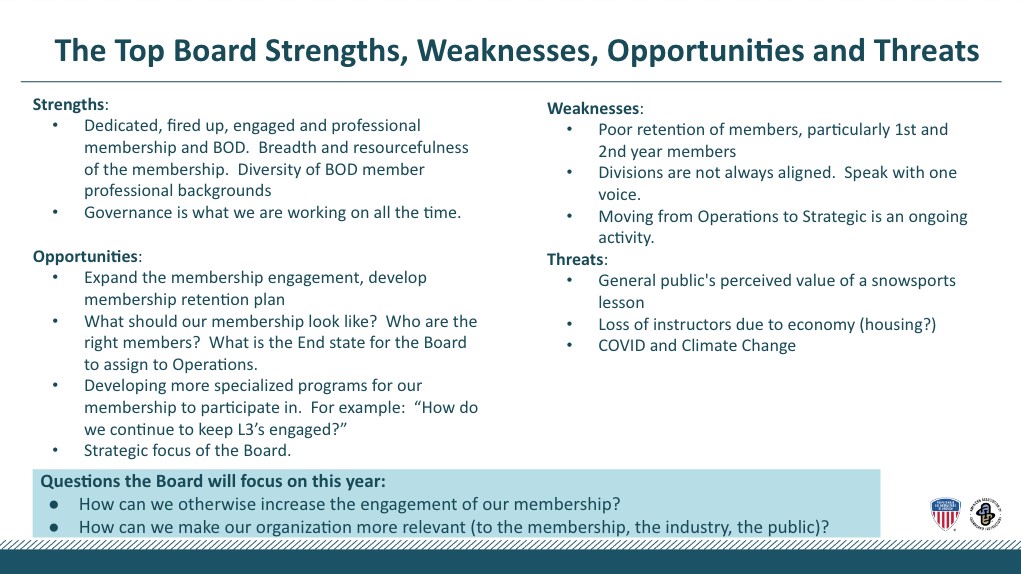
As you can see, much of the SWOT is focused where it should be, which is you, the membership. As a result of this, we’ve decided to focus on the following questions as an outcome from the SWOT Exercise:
“How can we otherwise increase the engagement of our membership? And how can we make our organization more relevant?”
As we work through all of these agenda items, we will report back to you regularly.
Western and the COVID-19 Crisis
Dan Healy, Board Member and Snowsports School Director at Sierra at Tahoe and Kristi Prochazka talked about what is happening with how the National Ski Area Association, PSIA-AASI and the Western Division was working on the COVID Crisis. Some of the highlights:
● PSIA-AASI Divisions’ Leadership working with the PSIA-AASI National office has spent significant time collaborating with the National Ski Area Association (NSAA) Members to support our member resorts in COVID response protocols for Snowsports Schools
● Western has appointed a COVID Medical Advisory Task Force with members who are in the medical field working the front lines of the COVID Crisis. The Goals of the Task Force:
● Conduct a webinar (to be scheduled) to further educate our Membership on what to prepare for the upcoming season
● Assist Western Division Staff with COVID Questions as needed
● The Board is aware that the COVID Crisis makes the scheduling of our education and certification events a fluid situation, and we ask for your flexibility as the season continues
Dan also spoke of his experience this fall as part of the Director Team at Sierra at Tahoe, and how their planning using data from NSAA and other resources helped them conduct a Mountain Cleanup with over 400 volunteers using some of the protocols they set up. The team at Sierra at Tahoe thought it was a very successful event, in part because of the preparations that the team had made there.
Kristi also spoke of some of the preparations ongoing with the Western Division Office, preparing for educational and certification events this winter. For more on this, please the Western Division Website.
Ed Foundation Update
Blaine Loman, Chair of the Ed Foundation and Vice Chair of our Board discussed updates from the Education Foundation, a very important organization that does an excellent job supporting our members. One of the biggest highlights is in part because of the hard work of your Education Foundation Board, donations have increased since the 15/16 season almost 700%. Thanks to all of the members who have contributed, so that many of our fellow instructors can receive financial aid in their quest to improve themselves as instructors through Education and Certification Events. Some other highlights:
● This season, the Education Foundation plans to award over 60 scholarships totaling $26,900 to support member training
● Examples of support:
● $3000 – Multiple Certification Scholarships: Twenty members who attempt a second or third discipline certification (Level 2 or 3), will receive $150 towards one module.
● $6000 – Level 2 and 3 Certification Scholarships: Forty members who attempt Level 2 or 3 in a discipline will receive $150 towards one module. The scholarships will be divided as follows: 18 Alpine, 18 Snowboard, and four more divided between Nordic and Adaptive.
● $1500 – National Academy Scholarships in the name of Miriam and Mike Sodergren: two members will each receive $750.
● Financial support for the training of our Education Staff and helping support two of our major education events
To apply for a scholarship, please visit the Western Division Website, and click on Education Foundation for more information.
Thanks again to the Education Foundation for their work in supporting our membership! Please support them with a donation.
Running for the Board for the 21-22 Season
Board Member Lea Logal talked about running for the Board for the next season. Four Board positions will be up for election. If you are interested, you can apply on our website at this link. Applications are due by February 15, 2021. The Western Division Board is seeking people who have an enthusiasm for supporting the Western Division. Please contact any of your Board Members or the Office if you have questions about serving on the Board.
Lea spoke of how serving on the Board has been a rewarding experience for her, even with not having any prior Board experience. This is a great opportunity for those who are making snowsports a career to gain some leadership skills as well as network in the industry. We encourage all members to consider running for the Board.
Please note: Board of Director members are volunteers. Board of Director candidates cannot be serving in any role that is paid for by PSIA-AASI Western Division, as there are conflict of interest laws in the state of California (plus other issues) with paid staff on the Board.
Summary
Greg Lyons came in for the wrapup:
● We know many of you are planning on continuing your training and want to take it to the next level this season.
● We have planned events even with the COVID uncertainty, but please plan on flexibility as schedules will most likely change throughout the season.
● If you need financial help to complete your training, please apply for a scholarship on the Education Foundation Website
Questions and Answers
If we have the Questions asked during the roundtable we should put them in and answer them here.
And Finally…

This is a screen grab from Squaw Valley – Alpine Meadows’s KT22 webcam dated April 6, 2020, a couple of weeks after the Snowsports Industry shut down. How can you not feel excited looking at all that fresh snow and not a track or a mogul. It may not have looked this way since Alex Cushing and Wayne Paulsen started building Squaw Valley back in the early ‘40’s.
We will ski and ride again if we remember to stay safe by following the new norms and use the support of our friends and family. Please be safe, continue to take PSIA-AASI Western Division training, follow your resort protocols and remember to protect yourselves as you serve our students.
Thank you for your support of the Western Division and the Western Division Education Foundation.
Tad Sheldon
Board Secretary
On behalf of the PSIA-AASI Western Division Board of Directors
